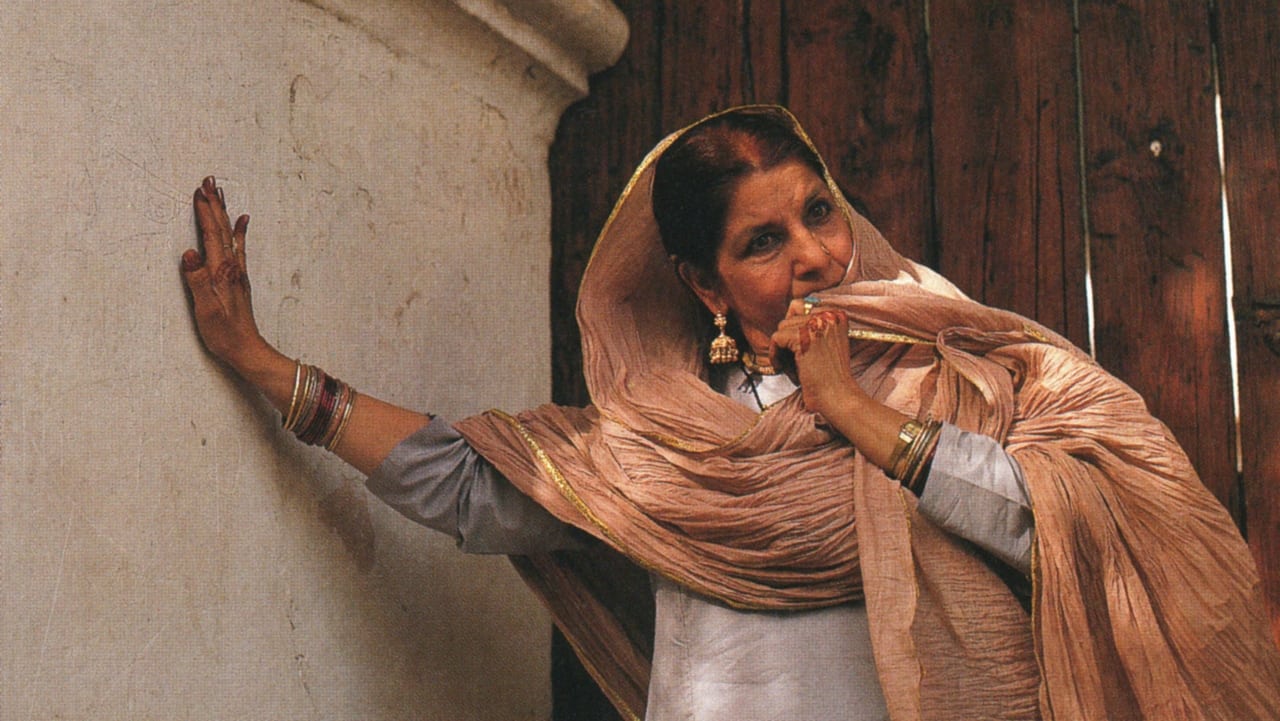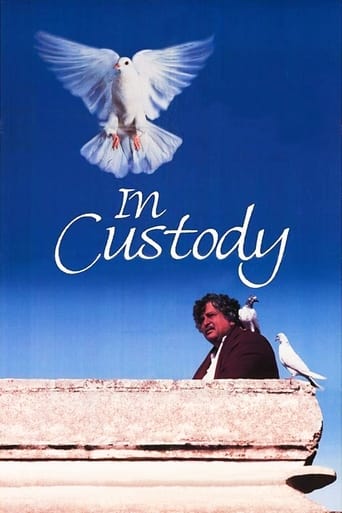Interesteg
What makes it different from others?
CommentsXp
Best movie ever!
Huievest
Instead, you get a movie that's enjoyable enough, but leaves you feeling like it could have been much, much more.
Arianna Moses
Let me be very fair here, this is not the best movie in my opinion. But, this movie is fun, it has purpose and is very enjoyable to watch.
monsoondreamer
In Custody is Ismail Merchant's beautiful retelling of Anita Desai's novel about the death of a language and a culture as reflected in the decline of one individual. Om Puri and Shashi Kapoor play men watching, with varying degrees of remorse and resignation, the death of the Urdu language, a language of poetry, erudition and courtliness. Shabana Azmi, as Nur's (Kapoor) second wife, a courtesan and singer of ghazals, is a bridge between what is passing and the rash future. Their performances are sensitive and subtle and quietly heartbreaking. The cinematography is exquisite, making the film visually rich and haunting. There are many strong performances, and the secondary characters are well-cast. The film is more theme-driven than plot-driven, so probably not suited to every taste. One of my very favorite Ivory-Merchant offerings.
Kaustubh Rajnish
Merchant Ivory movies are often about forgotten times , forgotten cultures and forgotten people. This one is no different. The ever dependable Om Puri plays an Urdu professor who attempts to document a dying but once grand urdu poet Nur (played convincingly by an obese Shashi Kapoor). Through his rather struggling attempt the story portrays the common hurdles which the language - lack of finance, poor understanding of technology and maybe all things modern, the complete ignorance of youth of the art and not to mention the petty selfishness of untalented people trying to hang on to what may be long gone The film as usual is beautifully art directed. The sets and settings take you right into old Muslim mohallas of a small city in MP. The performances of almost all are wonderful including an incredible outburst by Nur's second prostitute wife who wished she could have been a poet but couldn't due to the social class that she survives on. Its a poignant tale of subdued frustration which artists of dying arts often face.It also has some wonderful Urdu Poetry (a little like the more popular Sher o Shairi) A moving and poignant tale of decay, ambition and neglect.Highly recommended to Merchant Ivory, Om Puri and of course urdu fansMemorable quote " These electronic things electric fans, tape recorder are no good. They only confuse man more." - Poet Nur (Shashi Kapoor)
Dr Jacques COULARDEAU
An extremely good Indian film adapted from Anita Desai's book. It shows how India is a real laboratory for multiculturalism and at the same time it reveals a case where one culture is more or less dying in India itself because it is a minority culture based on a minority language language. Luckily it is the official language of Pakistan and this Urdu poetry is praised and appreciated in quite a few foreign countries. The film shows quite well how this old poetry finds it difficult to survive in the modern world of technology and metropolitan living. It has to be collected and saved for future generations and yet it is eroding fast. Parodies are common and the main noble themes are giving way to trite images and situations. The film though does not show the confrontation of the Hindu and Urdu cultures. It reduces the Urdu side of things to essentially the Moslem religion and it more or less entirely erases the Hindu religion. Then the discourse is no longer a discourse of exchange and sharing but rather a discourse of tolerance for the minority culture that has to come from a dominant, but neutral point of view. That's a shame in a way because the subject of the book was a lot wider and it concerned the whole world in many ways, the necessary moving away from the laicism some states preach against any religion and the indispensable adoption of a more tolerant, open and absolutely free approach of all philosophical or religious beliefs that must be granted the right to express themselves anywhere in society. Just like a man has the right to wear his color everywhere in society, a man must have the right to wear and express his beliefs everywhere in society. All dress codes and neutral-looking regulations are nothing but severe censorship if not discrimination. Yet this film is essential because it reveals a problem that is probably the most important problem to solve in the world in the coming decades: beyond tolerance how can we build a world of complete collaboration among all the different visions of the universe and life.Dr Jacques COULARDEAU, University Paris Dauphine, University Paris 1 Pantheon Sorbonne & University Versailles Saint Quentin en Yvelines
donelan-1
The first scene of an old man composing a poem, as he looks out the window of his decaying villa at the timeless Indian landscape, establishes that he is a great poet. The rest of the film shows us the price that he has willingly paid for his poetry, and the tragedy of writing in a dying language. The comic efforts of the school teacher to record the old man reading his poetry highlight the tragedy, and as the teacher becomes more and more entangled in the poet's life, he comes to understand (as we do) that none of the poet's sacrifices have diminished him, and that he has no regrets. Perhaps the most poignant scene is the teacher's interview with the poet's young second wife, who (unable to create poetry) performs his poems to music and passes them off as her own. Her response to his charge of plagiarism leaves him speechless, and reveals more about the position of women in Indian society than a dozen feminist studies. Perhaps the reason why this film received poor reviews is that everyone is looking for Hollywood (or Bollywood) stereotypes, and missing a very moving story that is told in a quiet and unpretentious way.

